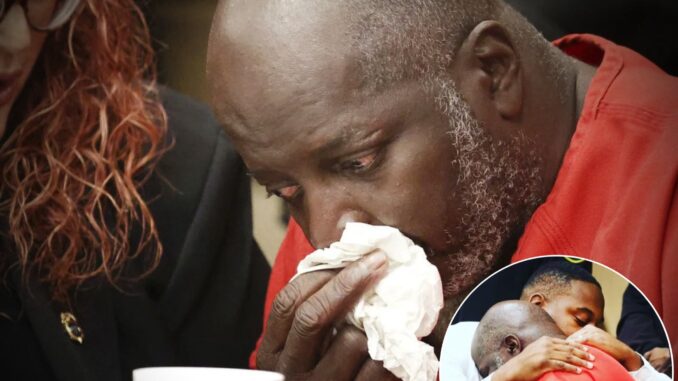
Florida Man Exonerated After 34 Years in Prison to Receive $1.7 Million in Compensation
In a bittersweet conclusion to one of Florida’s most heartbreaking wrongful conviction cases, a man who spent 34 years behind bars for a crime he did not commit is now set to receive $1.7 million in compensation. The settlement marks both a long-awaited acknowledgment of the injustice he endured and a reminder of the immense toll that wrongful incarceration can take on a life.
The man, whose name has been withheld from this article for privacy concerns, was convicted in the late 1980s of a violent crime based largely on faulty eyewitness testimony and questionable prosecutorial tactics. He maintained his innocence from the very beginning, but it would take more than three decades and the advancement of DNA technology for the state to finally accept that he had been telling the truth all along.
Wrongful Conviction and a Life Taken Away
The Florida justice system initially charged the man with rape and armed robbery after a woman was attacked in her home. The investigation was quick, and the conviction quicker, with the prosecution hinging its entire case on the victim’s eyewitness identification and circumstantial evidence. There were no fingerprints, no physical evidence linking him to the crime scene, and no witnesses placing him at the location—but the jury was convinced. He was sentenced to life in prison at the age of 24.
For more than three decades, the man remained incarcerated in a maximum-security prison, often in solitary confinement. He missed out on the most formative years of his life—starting a family, building a career, and seeing the world change dramatically through the rise of the internet, smartphones, and social media. Friends moved on, relatives passed away, and the world outside became unrecognizable.
The Turn of Justice
In 2019, advocates with the Innocence Project of Florida began reviewing his case. What they found was disturbing: the eyewitness testimony had been coerced, key evidence was ignored, and there was even a suspect description that clearly did not match the accused.
In 2023, new DNA analysis conducted on evidence collected from the crime scene revealed a profile that did not match the man. It instead pointed to another individual—someone with a lengthy criminal record who had never even been investigated during the original trial.
A judge overturned the conviction in late 2023, and he walked out of prison a free man for the first time since the Reagan administration.
The Fight for Compensation
Florida, like many states, has a process for compensating individuals who have been wrongfully incarcerated. Under the state’s Victims of Wrongful Incarceration Compensation Act, those exonerated are eligible for up to $50,000 for each year they were imprisoned—capped at $2 million. In this case, lawmakers approved $1.7 million in compensation, slightly under the cap, due to legal technicalities surrounding the original case filing.
State Senator Jason Pizzo, who pushed for the compensation bill, called the decision “the least we could do” for someone whose life was effectively stolen by a broken system.
“No amount of money will ever restore the years this man lost,” Pizzo said during a press conference. “But this compensation is a necessary step in recognizing the injustice and helping him rebuild what remains of his life.”
Adjusting to Life on the Outside
Since his release, the man has been staying with a cousin in Miami, slowly learning to adjust to a world that left him behind. Everyday activities—like using a smartphone, ordering food online, or navigating public transportation—have become new challenges. He’s been receiving counseling and job training, and has said he hopes to eventually work with organizations that fight for criminal justice reform.
“The world is so different. I’m still trying to catch up,” he said in a recent interview. “But I’m grateful to be free. I’m grateful to finally have my name cleared.”
He also acknowledged that the compensation is helpful, but not a fix-all.
“No amount of money can replace the years I lost. I lost my mom while I was inside. I missed everything—birthdays, weddings, funerals. I’ll never get that time back.”
A System in Need of Reform
The case has reignited debate in Florida and across the country about the flaws within the criminal justice system. Critics say it highlights the dangers of relying too heavily on eyewitness testimony, the lack of accountability for prosecutors who withhold evidence, and the need for stronger public defense systems.
“It’s not just about one man’s story,” said Nina Morrison, a senior attorney with the Innocence Project. “It’s about recognizing that this can—and does—happen all over the country. Until we implement real reforms, there will be more innocent people sitting in prison cells.”
As of August 2025, more than 3,400 people across the U.S. have been exonerated after wrongful convictions, according to the National Registry of Exonerations. The total number of years lost by those individuals exceeds 30,000.
Moving Forward
For the Florida man at the center of this story, life is now focused on healing and helping others. He has no desire for revenge or bitterness—only for a chance to finally live life on his own terms.
“I still believe in justice,” he said. “It took a long time, but the truth came out. Now, I just want to live.”
His story serves as both a tragedy and a triumph—a cautionary tale of a justice system that failed, and the enduring strength of the human spirit that refused to give up.

Leave a Reply